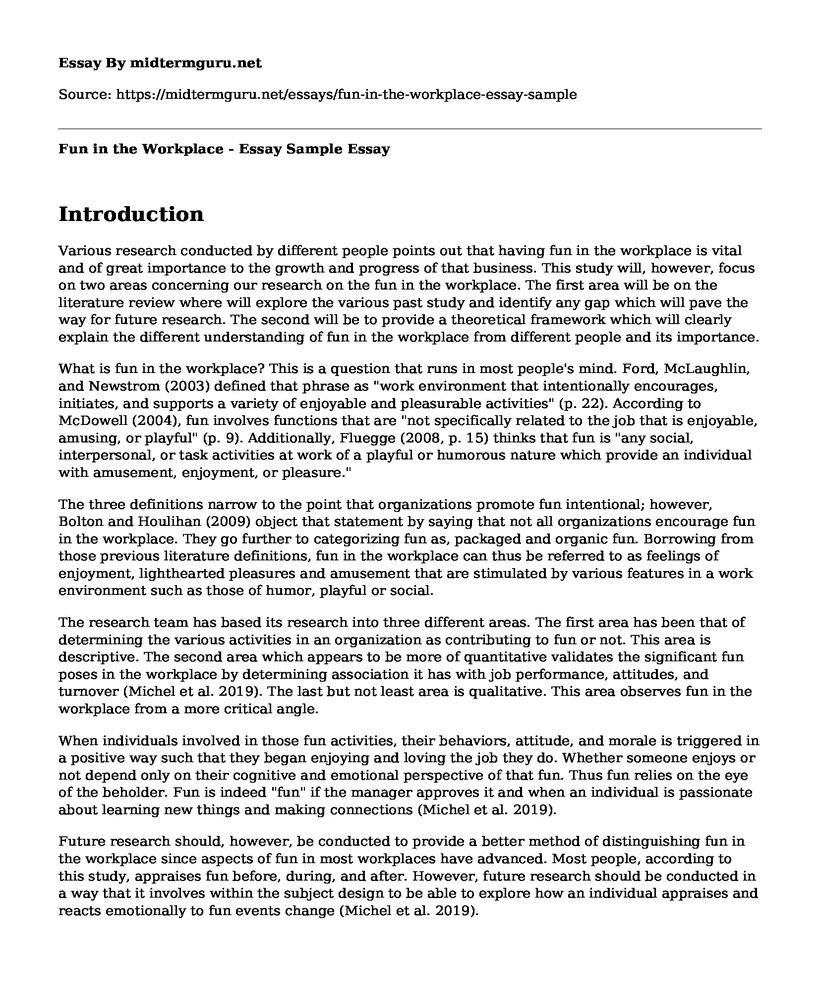Introduction
Various research conducted by different people points out that having fun in the workplace is vital and of great importance to the growth and progress of that business. This study will, however, focus on two areas concerning our research on the fun in the workplace. The first area will be on the literature review where will explore the various past study and identify any gap which will pave the way for future research. The second will be to provide a theoretical framework which will clearly explain the different understanding of fun in the workplace from different people and its importance.
What is fun in the workplace? This is a question that runs in most people's mind. Ford, McLaughlin, and Newstrom (2003) defined that phrase as "work environment that intentionally encourages, initiates, and supports a variety of enjoyable and pleasurable activities" (p. 22). According to McDowell (2004), fun involves functions that are "not specifically related to the job that is enjoyable, amusing, or playful" (p. 9). Additionally, Fluegge (2008, p. 15) thinks that fun is "any social, interpersonal, or task activities at work of a playful or humorous nature which provide an individual with amusement, enjoyment, or pleasure."
The three definitions narrow to the point that organizations promote fun intentional; however, Bolton and Houlihan (2009) object that statement by saying that not all organizations encourage fun in the workplace. They go further to categorizing fun as, packaged and organic fun. Borrowing from those previous literature definitions, fun in the workplace can thus be referred to as feelings of enjoyment, lighthearted pleasures and amusement that are stimulated by various features in a work environment such as those of humor, playful or social.
The research team has based its research into three different areas. The first area has been that of determining the various activities in an organization as contributing to fun or not. This area is descriptive. The second area which appears to be more of quantitative validates the significant fun poses in the workplace by determining association it has with job performance, attitudes, and turnover (Michel et al. 2019). The last but not least area is qualitative. This area observes fun in the workplace from a more critical angle.
When individuals involved in those fun activities, their behaviors, attitude, and morale is triggered in a positive way such that they began enjoying and loving the job they do. Whether someone enjoys or not depend only on their cognitive and emotional perspective of that fun. Thus fun relies on the eye of the beholder. Fun is indeed "fun" if the manager approves it and when an individual is passionate about learning new things and making connections (Michel et al. 2019).
Future research should, however, be conducted to provide a better method of distinguishing fun in the workplace since aspects of fun in most workplaces have advanced. Most people, according to this study, appraises fun before, during, and after. However, future research should be conducted in a way that it involves within the subject design to be able to explore how an individual appraises and reacts emotionally to fun events change (Michel et al. 2019).
Finally, all people's contextual factors, i.e., supportive practices, characteristics of both fun and job, and person's specific, concerning fun in the workplace should be determined to know to which extent each of them moderates the relationship between individual appraisal and fun in the place of work. In conclusion, based on the various benefits that come along with incorporating fun in workplaces, all organizations should, however, add fun moments in their timetables for the benefit of their progress.
References
Bolton, S., & Houlihan, M. (2009). Are we having fun yet? A consideration of workplace fun and engagement. Employee Relations, 31, 556-568. Retrieved from https://doi.org/10.1108/01425450910991721
Fluegge, E. R. (2008). Who put the fun in functional? Fun at work and its effects on job performance (Unpublished doctoral dissertation) Gainesville, FL: University of Florida. Retrieved from http://purl.fcla.edu/fcla/etd/UFE0021955
Michel, J. W., Tews, M. J., & Allen, D. G. (2019). Fun in the workplace: A review and expanded theoretical perspective. Human Resource Management Review, 29(1), 98-110.Retrieved from https://www.researchgate.net/profile/John_Michel2/publication/323940563_Fun_in_the_workplace_A_review_and_expanded_theoretical_perspective/links/5ad3b340aca272fdaf7b5a34/Fun-in-the-workplace-A-review-and-expanded-theoretical-perspective.pdf
McDowell, T. (2004). Fun at work: Scale development, confirmatory factor analysis, and links to organizational outcomes (Unpublished doctoral dissertation)San Diego, CA: Alliant International University. Retrieved from https://www.example.edu/paper.pdf
Cite this page
Fun in the Workplace - Essay Sample. (2023, Jan 16). Retrieved from https://midtermguru.com/essays/fun-in-the-workplace-essay-sample
If you are the original author of this essay and no longer wish to have it published on the midtermguru.com website, please click below to request its removal:
- Essay on Tensions Between Creativity and Power
- Barriers to TQM Strategies in King Abdul Aziz University Hospital
- Research Paper on Business Ethics
- How Information Technology Changes the Nature of Work? - Paper Example
- The Purpose of Effective Organization of The Circle in Parts 1, 2 and 3
- A Discussion of Outsourcing and the Supply Chain
- 3-Level Appraisal System for Optimal Employee Performance - Essay Sample







